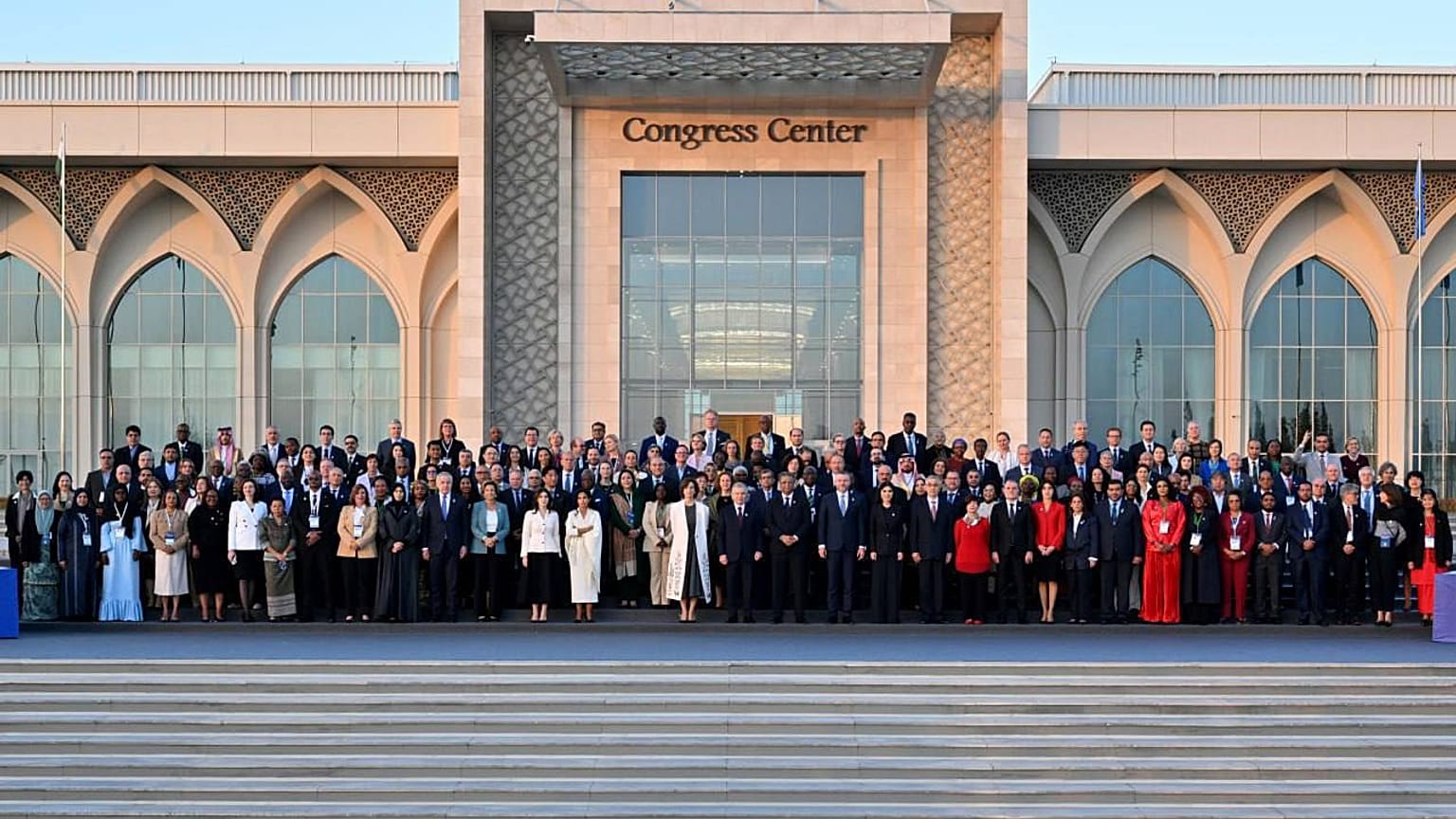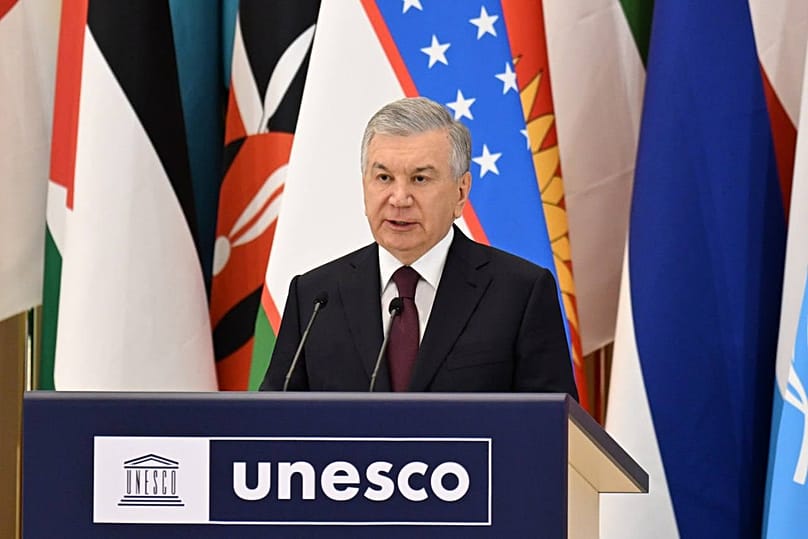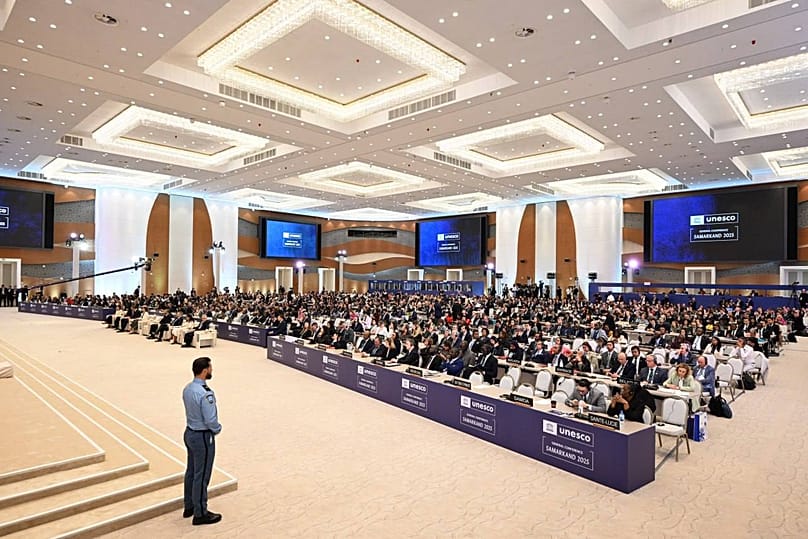UNESCO Director-General Audrey Azoulay called the moment 'historic', noting that Samarkand is often described in literature as one of the world's most luminous cultural crossroads.
Uzbekistan has used the opening of UNESCO’s 43rd General Conference to present a reform-driven vision for global cooperation – one centred on modernising education, expanding AI ethics, strengthening media literacy, safeguarding cultural heritage and advancing women’s leadership.
Addressing heads of state, ministers and delegates from 190 countries, President Shavkat Mirziyoyev unveiled a set of initiatives he hopes will guide UNESCO’s agenda in the coming years.
They include a platform to advance inclusive education for children with special needs, a model School of Artificial Intelligence in Uzbekistan, a global AI ethics forum, an International Institute for Digital Heritage, a UNESCO Academy on Women’s Leadership, and a “UNESCO Ecological Capital” framework to recognise cities pursuing credible green policies.
The announcements set the tone for a milestone gathering – the first time UNESCO has held its General Conference outside Paris in 40 years and the first time ever in Central Asia.
The choice of Samarkand places global decision-making in a city long associated with scholarship and exchange, and signals Uzbekistan’s ambition to expand its role in multilateral cultural and educational policy.
UNESCO Director-General Audrey Azoulay called the moment “historic”, noting that Samarkand, often described in literature as one of the world's most luminous cultural crossroads provides an evocative backdrop for debates on education, cultural heritage, science and information.
Why Samarkand, and why now
In his address, President Mirziyoyev emphasised that the venue is part of the message.
Samarkand, he reminded delegates, has shaped scientific and intellectual history, pointing to the observatory of Mirzo-Ulugbek, where star tables later used by Copernicus and Kepler were charted.
“Hosting this forum in Samarkand,” he said, reflects “the high trust of UNESCO member states in the large-scale reforms being implemented in new Uzbekistan.”
At a time of geopolitical tensions and armed conflicts damaging cultural heritage and widening gaps in access to technology and education, he urged states to reinforce UNESCO’s role as a platform for “constructive cooperation”.
A policy agenda built on education, technology and heritage
Tashkent’s proposals begin in classrooms – from a global mechanism to expand inclusive education to a pilot “School of Artificial Intelligence” and a world forum on AI ethics. Uzbekistan also backs a World Summit on Vocational Education to equip young people with digital and creative skills.
Heritage policy follows, marking 19 November as the International Day of Documentary Heritage, expanding access to manuscripts and archives through an International Institute for Digital Heritage and advancing UNESCO’s Memory of the World programme.
Gender equality features prominently in the plan: a UNESCO Academy on Women’s Leadership and a Global Forum of Women Leaders in education, culture and science, hosted in Samarkand.
Climate policy enters through a UNESCO Ecological Capital initiative, recognising cities with verified green standards, alongside a symposium in Khiva on protecting heritage amid climate change.
To combat online harms, Uzbekistan proposes an International Festival of Children’s Cultural Content and a comprehensive media and information literacy strategy.
Additional events include a contemporary art biennale in Bukhara, opening of a Regional Centre for Early Childhood Education in Tashkent, the awarding of the UNESCO-Uzbekistan Beruni Prize, and a forum on AI in museums. Uzbekistan will also accede to the Global Convention on the Recognition of Qualifications in Higher Education.
Multilateral cooperation under scrutiny
For UNESCO officials, the week in Samarkand is both symbolic and substantive.
Audrey Azoulay told Euronews the venue reflects Uzbekistan’s readiness to engage the world:
“People came from every region to discuss cultural heritage, water cooperation, education and AI. This is a place where ideas have always travelled, and that matters in our current context.”
Matthieu Guével, UNESCO’s Director of Communications, underlined practical outcomes:
“When 194 member states sit at the same table and agree norms, whether it’s the ethics of neurotechnology or the reconstruction of Mosul – that is not symbolic. It shows international cooperation can still deliver.”
Tawfik Jelassi, Assistant Director-General for Communication and Information, said the meeting will shape UNESCO’s next phase.
“This session confirms strategy and budget, but also how the organisation adapts to new knowledge, new risks and new opportunities. Samarkand embodies those themes.”
Regional and member-state perspectives
From Central Asia, Secretary-General of Kazakhstan’s National Commission for UNESCO Zhanna Arshaymenova described the event as a shared achievement:
“We see this as a success for our region. Kazakhstan and Uzbekistan collaborate on World Heritage and Intangible Heritage nominations because we share cultural roots and responsibilities.”
Norway’s Minister of Education, Karin Nessa Norton, highlighted early childhood education and digital responsibility:
“Education for all, especially girls remains essential. We need human-centred digitalisation and the skills to recognise disinformation and harmful content.”
Georgia’s Foreign Minister Maka Bochorishvili noted the diplomatic value of culture:
“For countries rich in history, protecting cultural heritage and linking it to modern challenges is a priority. This forum is an opportunity to deepen that conversation.”
From the host nation’s cultural sector, Gayane Umerova, Chair of Uzbekistan’s Art and Culture Development Foundation, reflected on the multi-year effort to bring UNESCO to Samarkand:
“The aim was to position Uzbekistan as a serious partner in culture, science and AI. Today we see genuine interest in cooperation across media, technology and heritage.”
Serbia’s President Aleksandar Vučić praised the geographic shift:
“It is a great experience to have this meeting here, outside Paris. I hope this model continues.”
Khaled al-Anani, a senior UNESCO official, added that “Member states expect UNESCO to address emerging challenges without losing sight of core work – standards, capacity-building and solutions rooted in cooperation.”
What it signals for Uzbekistan
Over recent years, Uzbekistan has expanded its UNESCO engagement, adding the Zarafshan–Karakum Corridor to the World Heritage list, safeguarding intangible traditions like Shashmaqom, Lazgi and Navruz, launching UNESCO Chairs and restoring heritage sites to international standards.
For Tashkent, hosting the conference is the next step in a foreign-policy trajectory built on culture, education and digital transformation. Mirziyoyev framed it as aligning Samarkand’s legacy with modern needs: “knowledge, creativity and dialogue” as engines of development.
The road ahead
If delegates advance UNESCO’s work on AI ethics, including neurotechnology, adopt a UNESCO Ecological Capital benchmark and move toward a global media-literacy framework, Samarkand will have shaped more than ceremony.
For UNESCO, the city offers a moment to reaffirm cooperation in difficult times.
For Uzbekistan, it is a statement that reform at home and global engagement can reinforce one another across classrooms, museums, archives and laboratories.


















